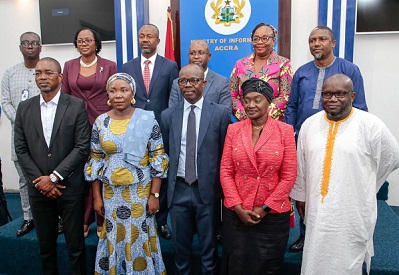
The Ministry of Communications, yesterday formally launched this year’s National Cyber Security Awareness Month (NCSAM), in Accra.
This year’s event scheduled between October 1 and 30 is on the theme: “Regulating Cyber Security: A public-private sector collaborative approach” and aims at enhancing public-private sector understanding of cyber security.
It will also seek to build synergies among all relevant stakeholders to ensure compliance with cyber security regulations.
Launching the event, the Deputy Minister of Communications and Digitalisation, Ms Ama Pomaa Boateng, said the government was committed to its digitilisation efforts in attaining a reliable and robust digital economy.
She explained that as part of the desire to accelerate inclusive growth through greater efficiency, transparency, and accountability in the delivery of public services, the government had implemented various digitilisation projects, including mobile money interoperability; a universal Quick Response (QR) code payment system, a national identification system, e-passport among others.
However, Ms Boateng said the digital space was prone to varying cyber-attacks which had become a concern for everyone.
“In October 2021, the Interpol reported that cyber rime reduced the Gross Domestic Products of African countries by more than 10per cent, which was an equivalent of $4.12billion,”Ms Boateng noted.
She said that there had been an increase in cyber-related incidents and crimes due to the over-reliance on Information Communications Technology (ICT) for socio-economic activities, in Ghana.
“The most prevalent cyber incidents received in 2020 by the cyber security authority through the Cybercrime/Cyber security Incident Reporting, points of contact launched in October 2019 were online fraud, unauthorised access, online blackmail, online impersonation, and the publication of non-consensual intimate images,” MsBoatengemphasised.
She said the overall prevailing incidents reported by businesses, particularly Small Medium Enterprises, during the period was online fraud, which was 63per cent of all reported crimes.
Ms Boateng said cyber security was key to sustaining the country’s digitilisation agenda, stressing that “Therefore, it is crucial to have effective measures to protect our critical information infrastructure, coordinate and respond to cyber security incidents, and to develop a cyber security culture in the interest of our socio-economic developers.”
The acting Director-General of the Cyber Security Authority, Dr Albert Antwi-Boasiako, called on Ghanaians to be cyber security conscious amid recent global cyber incidents that have negatively affected individuals, businesses, and other critical information infrastructure.
He said with the advancement in modern technology and the wide use of the internet, cybercriminals have leveraged the benefits of the internet to carry out their activities more covertly, thereby causing harm to individuals and businesses in the cruelest manner.
Dr Antwi-Boasiako said “while digitalization is bringing remarkable economic and societal benefits to majority of the global population, it is worth noting that these technologies, irrespective of the opportunities they create, have inherent risks such that when taken advantage of by cybercriminals, could have detrimental effects on individuals, enterprises, societies, and nations at large.”
“Studies have shown that, an increasing reliance on the Internet has created more risks and vulnerabilities and opened up new possibilities for criminal activity. The Global Risks Reports 2022 indicates that cyber security threats are growing; malware and ransom ware attacks increased by 358% and 435% respectively in 2020. The report also ranked cyber-attacks as the seventh most likely and eighth most impactful risk facing businesses globally,” he said.
The NCSAM, institutionalised since October, 2018, is the leading event within the cyber security space that seeks to educate children, the public, businesses, and government stakeholders on cyber hygiene best practices.
BY CLIFF EKUFUL







